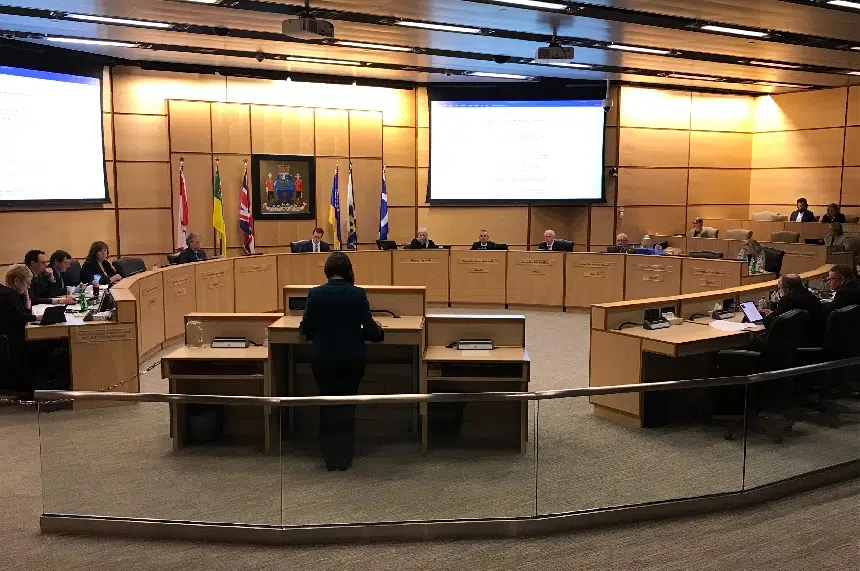After listening to more than a dozen people speaking on the matter, and after batting away a few amendments, Regina’s city council has passed its regulations for ride-sharing.
“I’m looking forward to seeing ride-share come to Regina as soon as possible,” said Mayor Michael Fougere after the meeting.
There were 19 delegations down to speak about the regulations on Monday night.
Some were regular people who wanted to talk about safety and suggested changes to the regulations, like one Regina woman who cannot be named due to a publication ban.
She explained to council that she’d been sexually assaulted by a cab driver, and because police were able to suspend his class four licence, he wasn’t able to drive a cab while his case was making its way through court. He was found guilty and recently sentenced.
She urged council to increase the licence requirements for ride-sharing drivers. “We cannot lower the bar for our residents; weak policies put people at risk.”
However, it was explained in the meeting that the class five licence requirement is a provincial regulation, and the city can’t change it.
Several members of the taxi industry spoke up, all talking about a need for ride-sharing regulations to be on par with taxi regulations. They asked for things like cameras in vehicles and vulnerable sector checks.
“At the end of the day they are doing the same job as a taxi but with no restrictions,” said Daljit Singh, a driver with Co-op Taxi, in his presentation.
Almost every delegate was, at least in theory, in support of allowing ride-sharing in Regina, some more than others.
“I think it’s special for our city. I think our businesses are going to benefit, residents are going to benefit. It’s really awesome,” said Justin Reves after the regulations were approved.
Reves presented to council, talking about how he’s used ride-sharing apps in all kinds of other cities and his experiences have all been great, and he wants it here too.
“I want to be proud that when we bring people here to the city, that when they land in the airport they can use the same services that they have available in nearly every other major centre in North America,” said Reves.
Some talked about an interest in letting the free market reign in Regina’s taxi industry, and another even spoke of what he called the “horrendous” cab services in Regina as a reason to bring ride-sharing to the city.
There were two delegates who wanted city council to take a little more time with the bylaw.
One talked about the possible environmental impact of having more vehicles driving longer with ride-sharing. The other delegate wanted to talk about the idea that ride-sharing is bad for drivers, having them work long hours for little pay.
Amendments
After all the delegates had their say, it was the councillors’ turn. A series of amendments were brought up and then voted down.
Councillor Lori Bresciani proposed requiring a vulnerable sectors check as well as a criminal record check for ride-sharing drivers.
A vulnerable sector check looks to see whether someone has a pardon, also known as a record suspension, for sex offences.
The motion was defeated. In speaking against it, other councillors said they felt the report put forward from the city’s administration was well put together and had everything they needed, while others said they thought a simple criminal record check is enough.
Councillor Andrew Stevens proposed two amendments to the regulations: That cameras in the vehicles be mandatory, and for the driver conduct section of the taxi bylaw to be applied to ride-sharing drivers as well.
Stevens said cameras would protect both riders and drivers, but other councillors brought up concerns about logistics – who would hold the information if there were a complaint made – and privacy, as in who controls what happens to that video and would stop it from, for example, being posted to Youtube.
In his argument for the driver conduct amendment, Stevens said it would empower ride-sharing drivers to refuse a fare if the customer is too inebriated or abusive. In response, other councillors said regulations on safe workplaces are already addressed through the human rights commission.
Both amendments were defeated.
Later, when asked why council wasn’t willing to go above the safety checks SGI and the province had set out in their regulations, Mayor Fougere asked why council should go above them.
“Why should we change a program that’s worked so successfully around North America and around the world. In my view, and I think in the view of the majority of council, the changes recommended were not necessary, they were onerous, and could cause us not to have this service, which people really want in the city.”
The regulations were ultimately approved with one small amendment; a report on ride-sharing in Regina be brought to city council a year after implementation.
Uber’s Michael van Hemmen spoke after the approval, happy that everything had gone through.
“Ride-sharing and taxis co-exist all around the world, and across Canada there’s numerous examples of cities even putting out reports highlighting that this is a fact – and so we just want to be one of the options.”
Addressing the many concerns about the safety of drivers and passengers that were brought up during the meeting, van Hemmen said Uber takes safety seriously, and he explained about safety features within the app itself.
“Through GPS tracking, you know who your driver is in advance of the trip actually beginning, and you can press a button and share your trip, your location, and the route that your driver is taking, with a loved one.”
van Hemmen said the service is excited to come to Regina and Saskatchewan but didn’t nail down a firm timeline on when it would be available.
The bylaw will come before Regina City Council at February’s meeting and, if it passes, it would come into effect in March.











